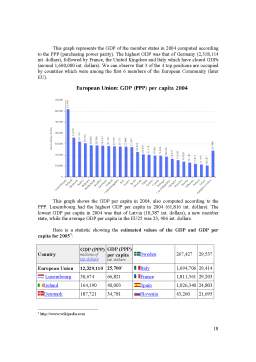Extras din proiect
Globalization vs. Regionalism
There is a paradox in international trade policy today. Globalization is on everyone’s lips — and yet, regional agreements have never been so popular. Many WTO members are part of at least one of them — and half of world trade now occurs between countries belonging to them.
The World as a global economy
Globalization is a highly complex and controversial concept.The term,it has come into fashion in 1980s and 1990s.Experiences show that the term is used in both a descriptive and a normative sense.In a descriptive sense globalization can be explained as a process where natural markets are becoming increasingly interlinked,where the interdependence of production is intensified and where the mechanism deciding about the allocation in goods and factor markets is increasingly,operating at a global level.In its normative sense,globalization is seen as a process of opening trade and foreign investment regimes of national economies.
Today,globalization involves numerouse features,but the following three seem to be the main engine driving global economic integration:a)internationalization of production accompanied by changes in the structure of production;b)expansion of international trade in goods and services;c)widening and deepening of international capital flows.
Meanings of Globalization
"Globalization" can mean:
- The formation of a global village — closer contact between different parts of the world, with increasing possibilities of personal exchange, mutual understanding and friendship between "world citizens", and creation of a global civilization.
- Economic globalization — "free trade" and increasing relations among members of an industry in different parts of the world (globalization of an industry), with a corresponding erosion of National Sovereignty in the economic sphere.
- The negative effects of for-profit multinational corporations — the use of substantial and sophisticated legal and financial means to circumvent the bounds of local laws and standards, in order to leverage the labor and services of unequally-developed regions against each other.
- The spread of capitalism from developed to developing nations.
It shares a number of characteristics with internationalization and is used interchangeably, although some prefer to use globalization to emphasize the erosion of the nation-state or national boundaries.
Globalism, if the concept is reduced to its economic aspects, can be said to contrast with economic nationalism and protectionism. It is related to laissez-faire capitalism and neoliberalism.
Globalization has become identified with a number of trends, most of which may have developed since World War II. These include greater international movement of commodities, money, information, and people; and the development of technology, organizations, legal systems, and infrastructures to allow this movement. The actual existence of some of these trends are debated:
- Increase in international trade at a faster rate than the growth in the world economy
- Increase in international flow of capital including foreign direct investment
- Greater transborder data flow, using such technologies such as the Internet, communication satellites and telephones
- Greater international cultural exchange
- Some argue that even terrorism has undergone globalization. Terrorists now have attacked places all over the world.
- Spreading of multiculturalism and better individual access to cultural diversity, with on the other hand, some reduction in diversity through assimilation, hybridization, Westernization, Americanization or Sinosization of cultures.
- Erosion of national sovereignty and national borders through international agreements leading to organizations like the WTO and OPEC
- Greater international travel and tourism
- Greater immigration, including illegal immigration
- Development of global telecommunications infrastructure
- Development of a global financial systems
- Increase in the share of the world economy controlled by multinational corporations
- Increased role of international organizations such as WTO, WIPO, IMF that deal with international transactions
- Increase in the number of standards applied globally; e.g. copyright laws
Globalization represents how an individual life can be transformed by global forces, and one can expand one’s connections around the world. There are more good indicators that Adverse characterizes the phenomenon:
- Reliance of developing countries on foreign aid, which comes with conditions.
- Economies of poor countries acting like appendages, while decisions are made by multinational corporations.
- Political conflicts become global in manner of cause and solution.
- Issues of democratization are becoming global.
Western countries have a belief that one way for capitalism to flourish is through democratization.
- Cultural exchange.
- The world coming together to solve key environmental problems e.g. ozone layer depletions.
Preview document
Conținut arhivă zip
- Globalization versus Regionalism.doc


























